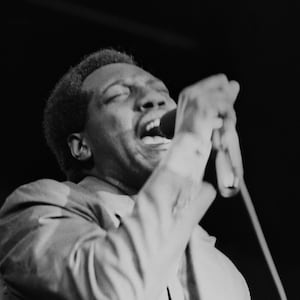When I would tell people that I was writing about Booker T. Jones, most of the time I drew blank stares. But when I added, “As in Booker T. and the MGs,” their faces lit up. Didn’t matter if they were old or young. They knew.
Maybe they just knew “Green Onions.” That’s enough right there. A song that sounds as fresh today as it did the day it was recorded in 1962. A song with no spare parts. It just rips right into your head and stays there forever.
When I heard at the last minute that Jones was in New York City doing promotion for his new memoir Time Is Tight, I called his publicist. “Can you be here at two tomorrow?” Eighteen hours later I was watching him try to eat a salad and answer questions at the same time. Nineteen hours later I had a good idea of how this man could write and perform a song as powerful and unforgettable as “Green Onions.”
ADVERTISEMENT
At 75, Jones still cuts an impressive figure: tall and fit, composed, with a gaze so direct that it would be withering if it weren’t so gentle. But really, it’s the voice that gets you: a measured, soft-spoken baritone that 50 years after Jones left his hometown of Memphis is still flavored with a southern accent.
That’s only the first hint of the mark left on him by the city and the South, and that mark, in many ways, is what his book is about.
“Memphis was a breeding ground for music. It was just like having a big garden—what kind of music do you want?” he says, setting down his fork while he describes what it was like growing up in what he bluntly calls “the most segregated city in the South.” At the same time, it was the city where Sun Records and then Stax Studios a decade later launched two of the biggest explosions in American musical history: rock and roll and then soul.
“That’s why I’m so happy I came from there, that I was born in Memphis,” he says. “I got such an education. On my paper route, I got exposed to [the great jazz pianist] Phineas Newborn. He was the first house on my paper route. It was tough because I had two full sacks of papers, but his door was open and this man was inside playing piano. I wasn’t going to move down the street! So I devised a way. Normally I would have folded my paper up on Mississippi on the steps of the church, but when I found out his house was there, I’d haul the whole thing down there and sit on his yard and fold them there!”
When Booker T. Jones played his first note inside the Stax Studio in Memphis, Tenn., he was 15 years old and still in high school. The day it happened, the bell had rung for second-period algebra when his friend David Porter poked his head around the door and got him out of class. After borrowing a baritone sax from the band room and then borrowing the band director’s car, they headed to the studio, which in 1960 still bore its original name of Satellite, named for the record store to which it was attached. And then and there, in a studio built inside a former movie theater, complete with sloping floor, Jones improvised a sax part for Rufus and Carla Thomas’ “’Cause I Love You” and stepped into American music history.
By that time, Jones was already a multi-instrumentalist and already playing gigs in clubs, in fraternity houses, and society teas. At the same time, he was also still in school, still playing with the marching band, and he still had his paper route. Some of this might have happened anywhere, but most of it could only have happened in Memphis. Just on that paper route, for example, he would pass not only Newborn’s house but Satellite Records, and he could hear the Staple Singers practicing in church.
Jones worked as a professional musician in Memphis until 1968, when he moved to California, and most of that time was spent as a songwriter, arranger, and on organ and piano, as one-fourth of Booker T. and the MGs, an integrated band in a segregated city but with no agenda beyond the music. As the fulltime Stax house band, they forged a trademark sound that was spare but powerful, a sound that could croon or slash. The music made by the MGs didn’t just showcase the recordings of Stax vocalists—they defined those records every bit as much as the performances by Otis Redding, Sam & Dave, Jean Knight, Eddie Floyd, or Carla Thomas, and in the process defined the very essence of Southern soul music.
Each chapter of Jones’ book is built around a particular song—“Green Onions,” or “Dock of the Bay,” or “Born Under a Bad Sign”—and in and around descriptions of how those songs came to be, Jones interweaves people and episodes from the rest of his life, from his childhood to the childhoods of his grandchildren.
Some of those moments feature marquee names and events—producing Stardust, Willie Nelson’s kajillion-platinum-selling album of standards; what it was like playing for the Obamas at the White House. When you’ve won Grammys and were one of the earliest inductees into the Rock and Roll Hall of Fame, you have every right to a victory lap. But the most memorable moments are his quiet yet vivid recollections of private life, his childhood especially, when as a little boy he’d while away afternoons with his neighbor Mrs. Humes and drink lemonade on her porch while she told stories about how fish lay eggs or how snakes got milked for their venom.
“For a little boy like me,” he writes, “the smells that came from Mrs. Humes’ yard at night were as intoxicating as the stories she told. I would stay up after dark so I could go over and see flowers she had that bloomed only at night. I was always just there, kicking dirt around or piddling with a rock or playing with the grass, listening to her talk to me. Sometimes she would let me water her flowers. Carrying the big heavy sprinkler can from around the side of the house, spilling water all over myself and the sidewalk, it was the happiest I could be in the afternoon there in Memphis.”
Unlike most musicians turned memoirists, Jones wrote Time Is Tight without a ghostwriter. Instead, he spent more than a decade teaching himself to write, beginning with essays while he read his way through Anne Lamott, William Faulkner, Alice Walker, Tolstoy, Mary Karr, and a shelf of others while he tried to “recognize what was my voice and what wasn’t. It was hard.”
He approached writing as he had approached learning music, obsessively and with discipline: even while the MGs were the hottest band in America and “Green Onions” was shooting up the charts, he had insisted on pursuing his conservatory training at Indiana.
The result of his literary apprenticeship is a book that is decidedly unslick and the better for it. All the little asides that a ghostwriter might have pruned away to keep the story moving are still there, all the stuff that maybe you don’t need to know but you’re glad you got to read: “Martin Luther King Jr. Boulevard. There is one in every city. You won’t find it in the white neighborhoods. More often than not, it will take you to the airport. I’ve tried this; if you’re lost and need to catch a flight, just get directions to Dr. Martin Luther King Jr. Boulevard.”
Most of the time, though, Jones has no trouble staying focused on his music, because musical moments are his keenest memories: the sound of an oboe coming from an open upstairs window in Mrs. Humes’ house, his mother at home playing “Clair de Lune,” what it was like in the studio the day the MGs and Otis Redding cut “Dock of the Bay.” For that matter, even most of the asides are about music, as when he points out that “Green Onions” arose directly from what he learned in school about Bach’s use of contrapuntal form.
“I can go back and listen to the music and hear all that,” he says.
I asked him if there was any kind of music he didn’t like. “One thing I learned at Indiana. I studied mostly western music, but I studied some eastern music too. And I don’t think it’s possible for me not to like music because it’s the fabric of every society. Who doesn’t use it? Who doesn’t use it for weddings, or wooing a woman, or all of our passages? It’s the fabric of every society. Who doesn’t use it? And people tell me, ‘We played ‘Time Is Tight’ at our wedding.’ ‘We walked in to “Green Onions.” Thank you.’ It’s what we use. Especially in religion.
“I had an Egyptian friend in Malibu and I spent so many hours over at his house listening to Umm Kulthum, the Egyptian singer. I didn’t know the religion or anything, but I could feel it. It just got me. And it was, ah, pretty far out for me to be listening to her and really hearing and feeling it. It takes her about 45 minutes to sing a song, and she leads the audience up and down, and the first time you listen, you realize that there are thousands of people in the audience and they are hanging on every word. I don’t know anything about the language or the culture. But it just went right here,” he says, tapping his heart.
He allows himself a small smile. “So yeah, I guess like most music.”
In conjunction with the release of his memoir, Jones has released an album, Booker T: Note by Note, on his own label, Edith Street Records, featuring new recordings of some of his most seminal recordings, as well as new material composed and performed with his son Teddy Jones.







